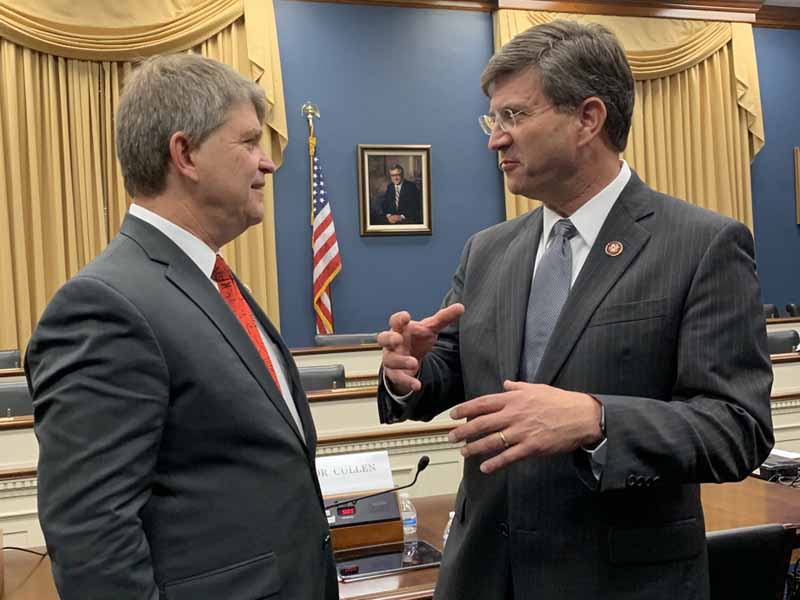Cut Red Tape for Family Physicians, AAFP Tells Congress
Academy Advises House Committee How to Help FPs Focus on Patient Care
September 23, 2019 04:21 pm News Staff – Family physicians are no strangers to the problems brought on by needless administrative tasks that stand between them and direct patient care: poor health outcomes, clinician burnout, and outlays of time and money that do nothing to improve health care.
The AAFP recently made these problems plain to legislators on Capitol Hill and offered up solutions that would let family physicians deliver better health care to more patients.
AAFP President John Cullen, M.D., of Valdez, Alaska, delivered written testimony to the House Committee on Small Business on Sept. 11, speaking to committee members about why physicians and patients need them to act to drastically reduce the administrative burden FPs face.
Easing this burden should be the Academy's No. 1 priority, respondents to the 2019 AAFP Member Satisfaction Survey have said, and a key target is prior authorization.
"The prior authorization process is out of control; it is increasing," Cullen told the committee. "And rather than a tool for preventing unnecessary or expensive care, prior authorizations negatively impact my patients' health and (are) a significant cause of family physician burnout and the closure of small private practices."

AAFP President John Cullen, M.D., speaks with Rep. Brad Schneider, D-Ill., who serves on the House Committee on Small Business. Cullen told the committee on Sept. 11 about problems caused by prior authorization and other administrative burdens.
Cullen related the story of a woman he was treating for Crohn's disease and severe psoriasis. After years of trying different regimens and consulting subspecialists, he was finally able to prescribe a medication that controlled both disorders. Then the payer suddenly demanded preauthorization for the drug, an ordeal that delayed the patient's care for several months. Not only did her condition worsen in that time, but once she was able to take the medication again, she had a serum sickness reaction to it that resulted in anaphylactic shock.
"We almost lost her," Cullen told the committee, "and now she can no longer use this medication that was working so well."
Story Highlights
Making the problem worse, most family physicians contract with seven or more health insurance plans -- the count is 35 at Cullen's practice -- all with their own prior authorization systems and frequently changing drug formularies that make it difficult for patients to receive high-quality, timely medical treatment.
This means, for example, that physicians and patients often don't know whether any given medication is covered until the patient tries to fill a prescription at a pharmacy. If it's not, the process may have to start over with a new prescription and another trip to the pharmacy.
"My patients rarely blame their insurance company for this administrivia," Cullen said. "They blame me for not getting them the medications they need, yell at my staff or just stop taking the medications they need to prevent hospitalization. This is the hidden cost of prior authorization.
"My staff burn out and quit because of the frustration inherent in this crazy system, compounded by being yelled at by patients for not having their medication."
The Academy advised the committee on changes that could beat back such burdens and free physicians to give more Americans the health care they need.
A first step would be for legislators, regulators and payers to adopt the recommendations the Academy and five other physician organizations laid out in the Joint Principles on Reducing Administrative Burden in Healthcare(2 page PDF).
These principles include calls to
- automate prior authorization -- and eliminate this burden entirely for clinicians in value-based payment models;
- revise or eliminate tasks that hinder physicians from providing timely, high-value patient care;
- align quality measures across the industry; and
- eliminate irrelevant documentation.
The AAFP also advised adopting the Academy's recommendations on prior authorization and step therapy(2 page PDF), including affirming that "family physicians using appropriate clinical knowledge, training, and experience should be able to prescribe medications and order medical equipment without being subjected to prior authorizations."
In addition, the AAFP told legislators that generic medications should never require preauthorization, step-therapy overrides and prior authorizations should never interrupt ongoing treatment, and hassles that payers throw up to block prescribing diabetic supplies should end.
The message to the committee echoes a Sept. 9 letter(10 page PDF) that the Academy and more than 350 other organizations sent Congress in support of the Improving Seniors' Timely Access to Care Act (H.R. 3107). This bipartisan legislation would help prevent delays in care by "streamlining and standardizing prior authorization under the Medicare Advantage program, providing much-needed oversight and transparency of health insurance for America's seniors," the organizations wrote.
Among requirements the bill proposes are
- create a real-time process for prior authorizations on items and services that are routinely approved,
- hold payers accounting for making timely prior authorization determinations and explaining denials, and
- direct payers to report their rate of approvals and denials.
Congress needs to act for the good of physicians and their patients, Cullen told the committee.
"Family physicians simply want to be able to prescribe efficiently and effectively what their patients need to help them manage their conditions in a way that maintains their health," he said.